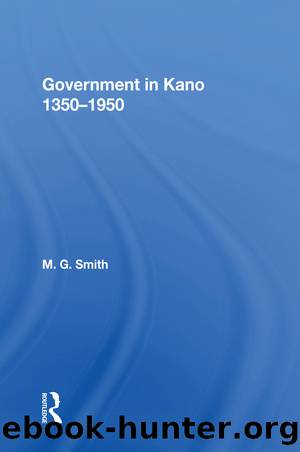Government in Kano, 1350-1950 by M. G. Smith

Author:M. G. Smith [Smith, M. G.]
Language: eng
Format: epub
Tags: History, Africa, General
ISBN: 9780813332703
Google: QUx0AAAAMAAJ
Goodreads: 3206499
Publisher: Westview Press
Published: 1997-06-12T00:00:00+00:00
Some Administrative Changes
Abdullahi seems to have been the first Fulani emir to levy a regular tax on the sedentary Fulani population at Kano. It is said that he collected 500 cowries from each Fulani householder as against 2,000 per annum from each Hausa (Habe) equivalent. If correct, though minor, this change institutes a significant new principle, namely that the Fulani also were liable to regular taxation. There were, of course, numerous exemptions from taxation, and most of these probably applied to men of Fulani descent. Malams, officials, and princes were excused from taxes; and it is not clear whether residents in the capital now became liable to annual tax. As before, blacksmiths, leatherworkers, silversmiths, builders, itinerant traders, the blind, lame and lepers were exempt, together with all slaves, for whom no tax was paid. The kudin shuke, the taxes on dyepits, date trees and cattle, the standard legal fees and death duty, the fifth (humushi) of booty, and tithes of grain and cattle were collected as before.
By this innovation Abdullahi intended to reduce the tax burden on his âHabeâ subjects, probably seeking to win their support in his conflict with the Ningi. In Usumanâs reign, âHabeâ householders had paid two thousand five hundred cowries per annum. Abdullahi sought to collect an amount equivalent to that by which he had reduced the âHabeâ tax rate from each Fulani householder. Manifestly, he was seeking to redistribute the tax load less unequally while maintaining the previous flow of revenue. Like other Fulani, he regarded the unequal distribution of taxation as morally and politically appropriate; but though conservative, this change reflects his recognition of the political dissatisfaction and depressed situation of the âHabe.â
It is probably also to Abdullahiâs reign that we must date the proliferation of rural courts in Kano. As indicated above, Abdullahi was unusually insistent on the exact enforcement of the shariâa, which was also a major objective of the Shehu Usuman and his closest supporters, Abdullahi dan Fodio and Mamman Bello. Certainly, Abdullahi first established a judge in the Kano city market to clear commercial cases quickly. He likewise established the first alkalai at Debi and Dingare, and perhaps also at Gano and Jahun. During the latter part of his reign, local limams trained in Muslim law served as judges at Lamire and Wasai. Some of the major rural units such as Rano, Gaya, Karaye and Dutse certainly had alkalai from Daboâs reign, and for some of these units we have complete lists of all local alkalai since that date. Dabo had also appointed an alkali at Getso to support the San Getso Mai Dabo. While on campaign, Abdullahi appointed an alkali at Gwaram in the extreme southeast.
Such rural alkalai reinforced Fulani domination throughout the country by imposing the stern penalties ordained by Muslim law for political and criminal offences. It is said that besides the towns already named, there were also alkalai at Dambarta, Bebeji, Ringim and Godiya during the latter half of the 19th century. Though probably sound, these data remain unconfirmed, and we cannot indicate the probable dates of the initial appointments.
Download
This site does not store any files on its server. We only index and link to content provided by other sites. Please contact the content providers to delete copyright contents if any and email us, we'll remove relevant links or contents immediately.
| Africa | Americas |
| Arctic & Antarctica | Asia |
| Australia & Oceania | Europe |
| Middle East | Russia |
| United States | World |
| Ancient Civilizations | Military |
| Historical Study & Educational Resources |
Machine Learning at Scale with H2O by Gregory Keys | David Whiting(4313)
Never by Ken Follett(3957)
Fairy Tale by Stephen King(3398)
Oathbringer (The Stormlight Archive, Book 3) by Brandon Sanderson(3214)
The Man Who Died Twice by Richard Osman(3079)
Will by Will Smith(2920)
Rationality by Steven Pinker(2364)
Can't Hurt Me: Master Your Mind and Defy the Odds - Clean Edition by David Goggins(2341)
The Dark Hours by Michael Connelly(2308)
Friends, Lovers, and the Big Terrible Thing by Matthew Perry(2230)
The Dawn of Everything: A New History of Humanity by David Graeber & David Wengrow(2208)
Principles for Dealing With the Changing World Order: Why Nations Succeed and Fail by Ray Dalio(2055)
A Short History of War by Jeremy Black(1848)
HBR's 10 Must Reads 2022 by Harvard Business Review(1844)
Go Tell the Bees That I Am Gone by Diana Gabaldon(1758)
A Game of Thrones (The Illustrated Edition) by George R. R. Martin(1745)
Kingdom of Ash by Maas Sarah J(1678)
515945210 by Unknown(1667)
443319537 by Unknown(1559)
